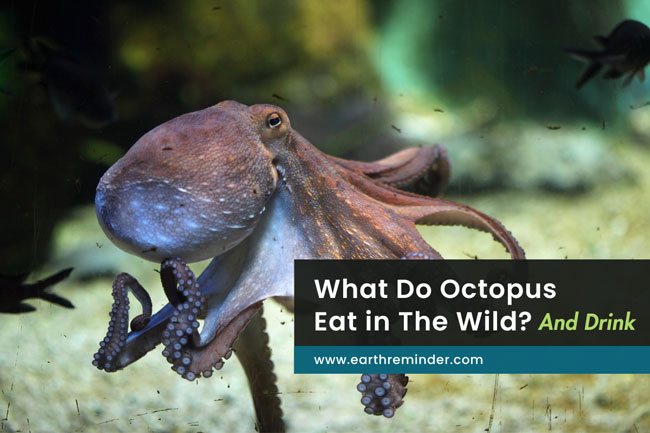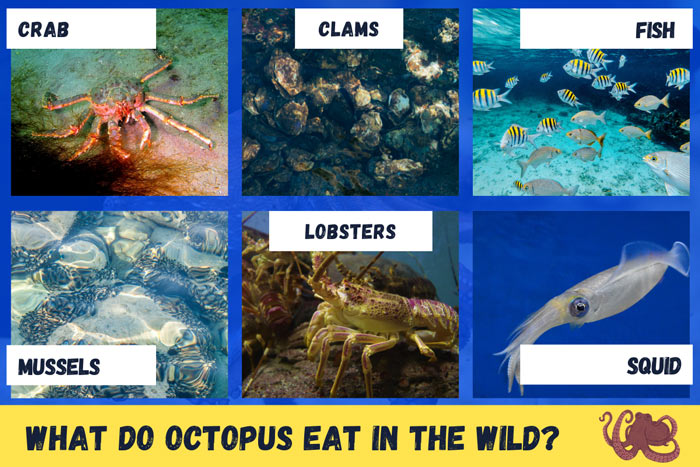What Do Octopus Eat and Drink? – In The Wild
An octopus in the wild would eat almost anything it comes across while swimming or crawling throughout the ocean floor. Most of the organisms that benthic octopuses consume live in coral reefs or on the seafloor. The word “benthic” means the bottom of a water body like an ocean, sea, or lake. Such octopuses frequently hunt for mollusks, worms, especially crustaceans. Lobsters, crabs, whelks, and clams are the most preferred prey within specific categories.
Octopuses can occasionally guide or lead small fish. It happens sometimes, but not always. They might help each other find food or stay safe. In contrast, octopuses that hunt in open water are now more likely to consume fish, shrimp, and some other cephalopods as food.
Octopuses sometimes eat other octopuses. This is known as cannibalism. It can happen when food is scarce or when one octopus is much bigger than another.
Occasionally, very large octopuses eat sharks. It’s rare, but it happens. Octopuses use suction cups and strong arms to grab sharks and eat them with their beaks. It shows that octopuses can be both hunters and scavengers, eating a variety of food in the wild depending on their size. Let’s dive deeper into the diet of octopus.
Table of Contents
What Do Octopus Eat In The Wild?
Octopuses are predators that consume a variety of sea animals. The octopus has many different species, and each species eats different prey. Plankton and other small sea mollusks are the primary food sources for small octopuses. A medium-sized octopus would consume clams, mussels, prawns, and small crabs for food. Giant octopuses eat larger prey such as lobsters, fish, other octopuses, and squid. The most common things octopus eat in the wild are as follows:
Mussels, Clams, and Crabs
Mussels, clams, and crabs are the main food sources for medium and large octopuses.
- Mussels: Octopuses like to eat mussels. To open the mussel shells, they use their arms. Octopuses can crack hard shells with their beaks. In general, mussels stick to rocks, which makes octopuses work a little to get them.
- Clams: Octopuses dig in the sand for clams. Octopuses can break hard shells and eat the soft stuff inside after finding them.
- Crabs: Crabs are a little bit harder to eat because of their mobility and have strong claws. Here also octopuses use their arms to hold crabs and keep them from escaping.
All of them are full of nutrients that keep them healthy.
Fish and Lobsters
Octopuses often eat fish. They’re skilled hunters who use their eight arms to catch fish. Depending on the species, some octopuses watch or stalk their prey before grabbing it. Some might even use their color-changing abilities to blend in with their surroundings and surprisingly hunt fish.
The octopuses also eat lobster. With their arms, octopuses can dig into the sand and find lobsters. Their strong beaks can also crack open lobster shells. They will eat their soft parts when their shells are open.
Small Sea Mollusks and Plankton
Mollusks like snails and slugs are often eaten by octopuses. They’re easier to catch as compared to other prey. An octopus can pick up small mollusks easily from rocks or the seafloor with its arms.
Most adult octopuses don’t generally eat plankton because they prefer bigger prey. But when they’re young, as when they hatch, they’ll eat plankton. Octopus babies are tiny and don’t hunt as well, so they just eat what’s easy. For example, they might eat tiny crustaceans like copepods, and small fish larvae. They sometimes also eat larval crabs. Plankton and sea mollusks provide the nutrients and minerals they need to survive.
Squid
Under the classification of animals, squid and octopuses are both members of the cephalopod family. Octopuses do eat squid sometimes. Squids are tricky to catch because they shoot ink to defend themselves. Squids are normally fast swimmers, but octopuses are smart to grab them. They grab squids with their eight arms and bite them with their beaks. The octopus uses its digestive enzymes to break down the soft tissues of the squid, making it easier to consume.
It is also interesting to know that octopuses can eat each other! Octopuses tend to do this if food is hard to find or if they are the main predators. Smaller octopuses usually get eaten by bigger ones. They catch their own kind the same way they catch other prey by grabbing and eating with their beaks.
They often use ambush tactics, camouflaging themselves to catch their prey by surprise. The venom of an octopus can paralyze or even kill its prey, which makes it easier for the octopus to eat.
What Do Octopus Drink?
Octopuses live in water, but they don’t drink it. Their bodies have a special way to get rid of waste and balance water. Unlike humans, who drink water and then urinate to remove waste. Octopuses get nutrients and moisture from eating food, like crabs and fish. It’s generally enough for them to live and be healthy. So, octopuses don’t need to drink water because they have other ways to get what they need to live i.e., water.
What Does Wild Octopus Not Eat?
Since they are opportunistic hunters, wild octopuses consume a wide range of animals they come across in their natural habitat. Wild octopuses, meanwhile, are not likely to eat or avoid the following items:
- Poisonous Animals: As intelligent creatures, octopuses have been recorded avoiding poisonous or venomous prey, including some fish species and some snails.
- Large, Hard-Shelled Prey: While capable of eating hard-shelled creatures like clams and mussels, wild octopuses often favor easy-to-eat prey with soft bodies, including crabs, shrimp, and small fish. They’re less inclined to go after larger, hard-shelled prey because they take more work to catch them.
- Plants or Plant Matter: Being carnivores, octopuses would not consume plants or plant matter. They need a diet rich in protein and other nutrients found in foods made from animals.
- Other Octopuses: While several species of octopus have been known to consume one another in captivity, this behavior is less frequent in the wild. They are generally solitary animals but can switch to cannibalism if food is scarce.
It is essential to remember that the diet of wild octopuses might change based on where they live and the availability of prey in their surroundings.
“If you’re interested in ocean life, you may also want to read about marine ecosystems and their types.”
Conclusion
Being carnivorous creatures, octopuses in the wild eat a range of shellfish, such as crabs, clams, mussels, and shrimp. They have also been observed eating fish, lobsters, and other tiny marine creatures. Octopuses are expert hunters who can catch their prey using their cunning and camouflage skills. To surprise their prey and fit in with their surroundings, they may alter the color and texture of their skin. Besides that, they use a strong beak to crack mollusks and crab shells. Generally, octopuses consume a wide variety of marine animals in their diet and therefore are skilled hunters and catchers of prey due to their special talents.

